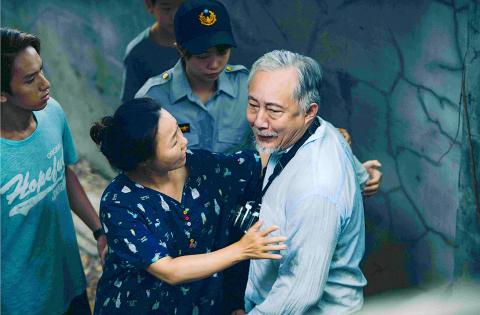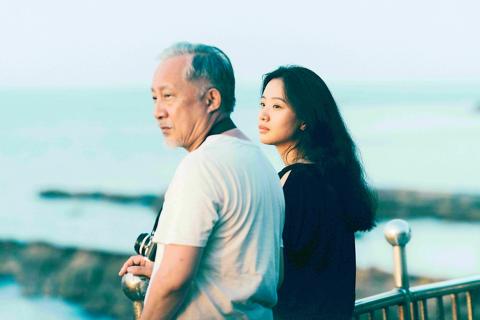It seems like director Chang Tso-chi (張作驥) has a lot he wants to say in Synapses (那個我最親愛的陌生人), which opened for this year’s Golden Horse Film Festival. A lot has happened to him in the past few years — he was convicted of sexual assault and sent to prison in 2015 while his feature Thanatos, Drunk (醉生夢死) won big at that year’s Taipei Film Awards; soon after his release in 2017 his mother developed acute dementia and he cared for her until her death.
Synapses, which earned Chang a nomination for Best Director at Saturday’s Golden Horse Awards, is dark and muddled, and although the underlying theme is clearly dementia and the loss of memories, the plot meanders rather aimlessly. It seems like a lot is going on, but none of it exactly fits together, and there’s not much of a driving narrative as it feels like the film could have ended any time in the second half.
Perhaps this incoherence reflects the existence of Chun-hsiung (Zhang Xiao-xiong, 張曉雄), an elderly veteran suffering from dementia, living with his family in a dilapidated old house in Keelung. He is the film’s weightiest presence, but he’s also not really there due to his deteriorating mind. There is no cure for his condition, and there’s no way to sugarcoat such a story, which adds to the hopelessness of the tone. But the resulting product is rather hard to watch, feeling much longer than its 116-minute running time.

Photo courtesy of atmovies.com
The film is seen mostly through the eyes of Chun-hsiung’s 9-year-old grandson Chuan (Lee Ying-chuan, 李英銓), who tries to make sense of the events that unfold while trying to hatch a turkey egg for his school assignment. He plays the role of the observer that keeps a certain distance from the other characters, but he’s also just as involved because many of the conflicts arise because of him.
Most of the acting is superb, with a masterful performance by Lu Hsueh-feng (呂雪鳳), who plays Feng, Hsiung’s seemingly loving wife of 30 years who devotedly takes care of him. But when Chuan’s mother Xiao Meng (Li Meng, 李夢) comes home after spending six years in jail, things start to unravel and the secrets of this seemingly normal family are revealed.
There’s also Chuan’s good-for-nothing gangster father Wen (Su Chun-chung, 蘇俊忠), Chang’s former military comrade Cheng-en (Liu Cheng-en, 劉承恩) and Turkey Brother (李幼鸚鵡鵪鶉小白文鳥, Alphonse Perroquet/Parrot Caille/Quail Youth-Leigh), a strange homeless man that Chuan hangs out with. All these people’s lives are intertwined in some way and heavily weighed down by the past, but like Hsiung’s mind, they also appear disconnected to each other and to the audience as well. The editing style also reflects this, depicting the story in a patchwork of vignettes.

Photo courtesy of atmovies.com
Adding to this disconnect is the use of languages in the film — Feng mostly speaks in Hoklo (also known as Taiwanese), while Hsiung speaks Cantonese and Mandarin and Meng talks in a Beijing accent. Chuan only speaks Mandarin even though Feng talks to him only in Hoklo. It’s mentioned in one scene that she spent time in Hong Kong, Canada and China, but it’s jarring how differently she speaks from the rest of her family. This device further highlights how fractured this family is, as if they were strangers thrown under one roof.
It’s hard not to compare Synapses to A Sun (陽光普照) by Chung Mong-hong (鍾孟宏), who was chosen for the Golden Horse’s best director over Chang. Both films explore complicated and turbulent family relations, and both plots involve a member who returns home from prison. Dysfunction and despair permeate both films, but by comparison A Sun is much more coherent and focused with a clear message. It was easy to sit through A Sun, but Synapses takes the suffocating tension way further, to the point where the audience needs to frequently break their focus and gasp for air.
If A Sun is about repressed feelings and things unsaid, Synapses is about repressed lives, which is encapsulated in the opening quote, “Without those memories, would his life be better?” It’s bleak, bleak stuff, but sadly, it’s how many Taiwanese of that generation lived, hiding their real selves to live up to the expectations of others. By contrast, Turkey Brother is completely lucid, but he chooses to live the way he does simply for freedom.
It’s is a bold and ambitious attempt in telling a complex saga that spans decades, with great acting, production quality and a subtle yet penetrating jazzy score. But sometimes a movie can get too loaded to enjoy, especially when it’s dealing with such a heavy topic.

April 14 to April 20 In March 1947, Sising Katadrepan urged the government to drop the “high mountain people” (高山族) designation for Indigenous Taiwanese and refer to them as “Taiwan people” (台灣族). He considered the term derogatory, arguing that it made them sound like animals. The Taiwan Provincial Government agreed to stop using the term, stating that Indigenous Taiwanese suffered all sorts of discrimination and oppression under the Japanese and were forced to live in the mountains as outsiders to society. Now, under the new regime, they would be seen as equals, thus they should be henceforth

Last week, the the National Immigration Agency (NIA) told the legislature that more than 10,000 naturalized Taiwanese citizens from the People’s Republic of China (PRC) risked having their citizenship revoked if they failed to provide proof that they had renounced their Chinese household registration within the next three months. Renunciation is required under the Act Governing Relations Between the People of the Taiwan Area and the Mainland Area (臺灣地區與大陸地區人民關係條例), as amended in 2004, though it was only a legal requirement after 2000. Prior to that, it had been only an administrative requirement since the Nationality Act (國籍法) was established in

With over 80 works on display, this is Louise Bourgeois’ first solo show in Taiwan. Visitors are invited to traverse her world of love and hate, vengeance and acceptance, trauma and reconciliation. Dominating the entrance, the nine-foot-tall Crouching Spider (2003) greets visitors. The creature looms behind the glass facade, symbolic protector and gatekeeper to the intimate journey ahead. Bourgeois, best known for her giant spider sculptures, is one of the most influential artist of the twentieth century. Blending vulnerability and defiance through themes of sexuality, trauma and identity, her work reshaped the landscape of contemporary art with fearless honesty. “People are influenced by

The remains of this Japanese-era trail designed to protect the camphor industry make for a scenic day-hike, a fascinating overnight hike or a challenging multi-day adventure Maolin District (茂林) in Kaohsiung is well known for beautiful roadside scenery, waterfalls, the annual butterfly migration and indigenous culture. A lesser known but worthwhile destination here lies along the very top of the valley: the Liugui Security Path (六龜警備道). This relic of the Japanese era once isolated the Maolin valley from the outside world but now serves to draw tourists in. The path originally ran for about 50km, but not all of this trail is still easily walkable. The nicest section for a simple day hike is the heavily trafficked southern section above Maolin and Wanshan (萬山) villages. Remains of